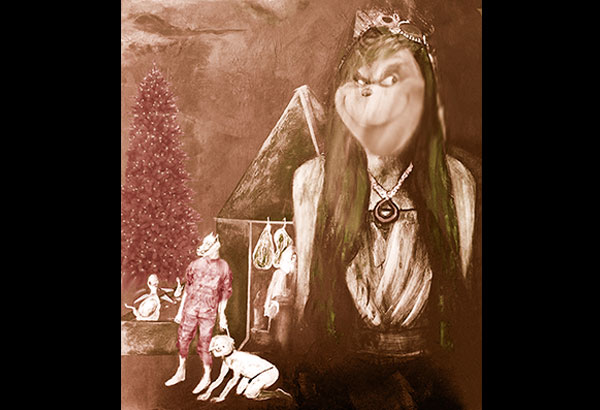A children’s Christmas play during martial law

Illustration by IGAN D’BAYAN
The old countryside feel of barrio San Bartolome in Novaliches, Quezon City, seems to have disappeared from the landscape of modernizing Metro Manila. A glance at a Google map reveals a maze of subdivisions, commercial establishments and other structures from Quirino highway to the boundaries of the village. Holy Cross Memorial Park remains the only place where grassy space still abounds.
On All Souls Day a few years back, after visiting the grave of a relative at Holy Cross, my sister and I decided to look for the house inside San Bartolome where my wife and I — both on the arrest list of the military for our involvement in the underground resistance against the Marcos dictatorship — had spent almost a year as, incredibly as it may sound, kindergarten and nursery teachers. We could not find even the street leading to that house.
When Marcos declared martial law in September 1972, many in our group of campus writers who were also First Quarter Storm activists went underground, assigned to units producing alternative news features not carried by the compromised media, as well as stories, essays, poems about oppression and resistance. Many of the underground (UG) houses these units occupied were eventually raided, and the activists either arrested or forced to evacuate to safer places.
From the provinces, my wife Aida and I came back to Manila to weather out the wave of arrests which disrupted our underground activities. We would spend a night or two with some relatives who were always fearful for our safety and theirs, or with sympathetic friends who harbored us for several days, until my father-in-law found us a temporary sanctuary in a friend’s house in the barrio of San Bartolome, in 1974 still a rustic village with fields lying fallow, patches of grassland and some remaining forests. The place where we stayed was a subdivision with not more than 30 houses.
Anonymity was one condition for staying with the family. Until we left, their neighbors and friends knew us under assumed names. Our hosts were a hard-working couple with two children who attended a private school. The wife happened to be a teacher at a university in Manila, and the husband was in the hauling business, delivering cargo for companies. At that time, the lady was attending a seminar on pre-school education, and when she learned about our background as writers from UP, she and her husband suddenly thought of putting up a nursery and kindergarten school for the children of the village and the surrounding area.
Our credentials seemed impeccable to the couple: my wife wrote poems and essays, and I was a Palanca-awarded writer who had also taught university students, as well as elementary pupils when I was an UPSCA catechist in college. But neither of us had had a single unit of Education, yet this did not deter our hosts.
After a brainstorming session, we came to terms. The mistress of the house was to be the principal of the new school. My wife would teach the kindergarten section, while I would handle the younger nursery class. We were not to receive any wages, not even a small percentage of the school’s income which turned out to be considerable. In exchange for our services, we were free to stay in their house as political refugees for as long as the school was in existence. We could also be the “concessionaire” for a small canteen, and earn whatever mini-profit we could get from selling biscuits and the calamansi juice I had to prepare myself. The canteen fell under my jurisdiction, and one of my tasks was to slice and squeeze several dozen calamansi fruits every morning.
We produced our own visual aids. On a long strip of manila paper, I used crayons to draw characters from fairy tales, and this was rolled around a piece of wood at the end of which was a handle. The drawings would then appear on a TV-like wooden stand which had a big square window to simulate a screen, and while my wife narrated the story, I would rotate the handle, revealing the characters and the action as the story unfolded.
Two months before Christmas, we began to plan for the pupils’ presentation, in the spirit of “giving the parents their money’s worth.” Well, the more important reason was that many of the children were very talented, and I suggested a Christmas play that I would write, and Aida would direct. I wrote Tagalog lyrics for classic carols and children’s songs, and thought up a storyline that combined the traditional Christmas story with how life was under martial law (cruel Roman soldiers acting not too differently from the dreaded Metrocom, for instance). I made the props myself, from papier-mâché helmets to wooden swords. On the night of the performance, I played the background music from behind a curtain, with guitar, melodica and recorder. The children had learned their parts so well, delivering their deep Tagalog lines without a hitch, emoting like naturals and singing their hearts out. The parents and guests were so impressed.
It was the first play I ever wrote. The next one would be written in prison two years later, about the grim realities of life under martial law.



















